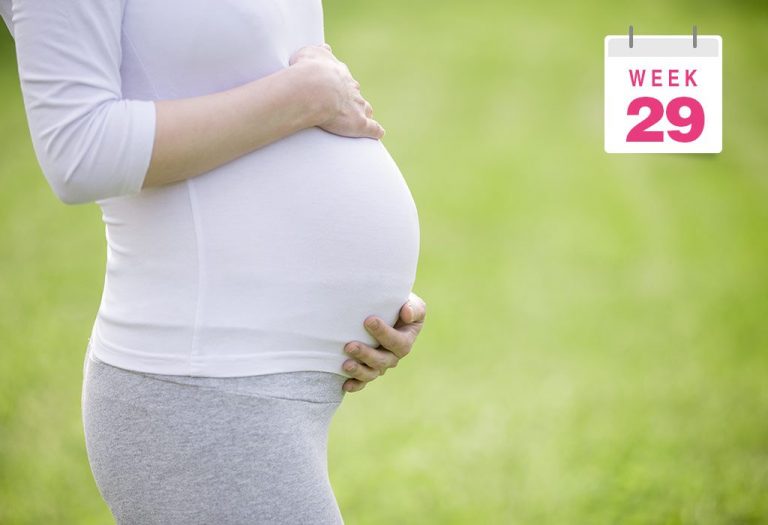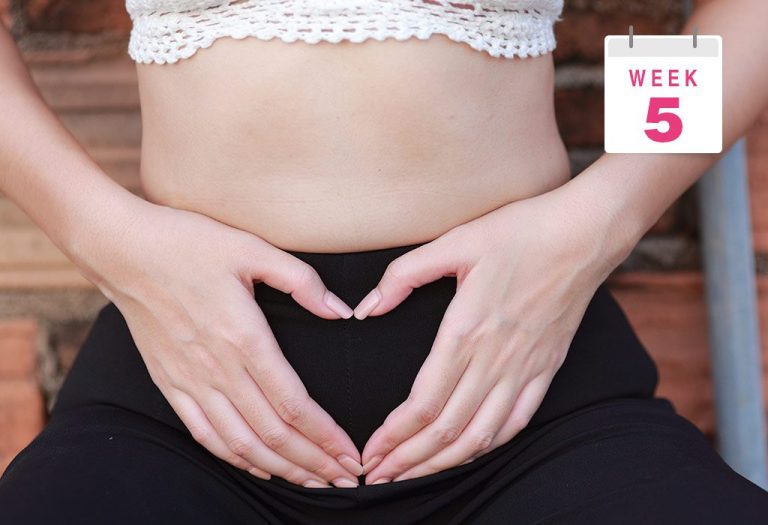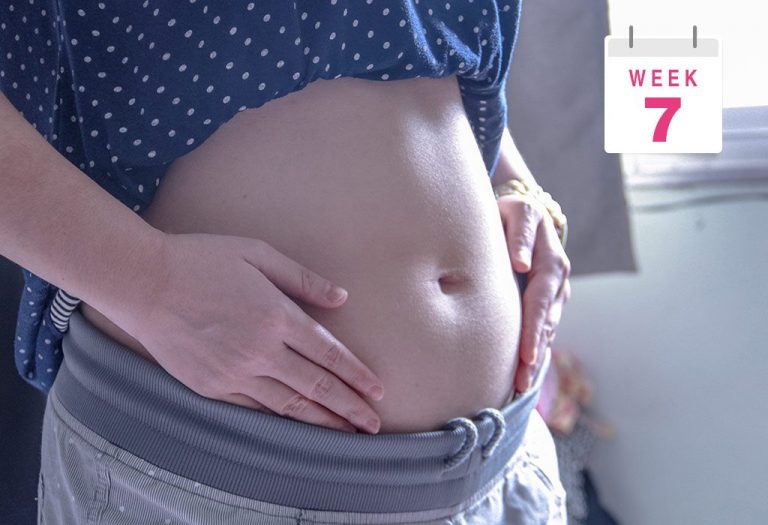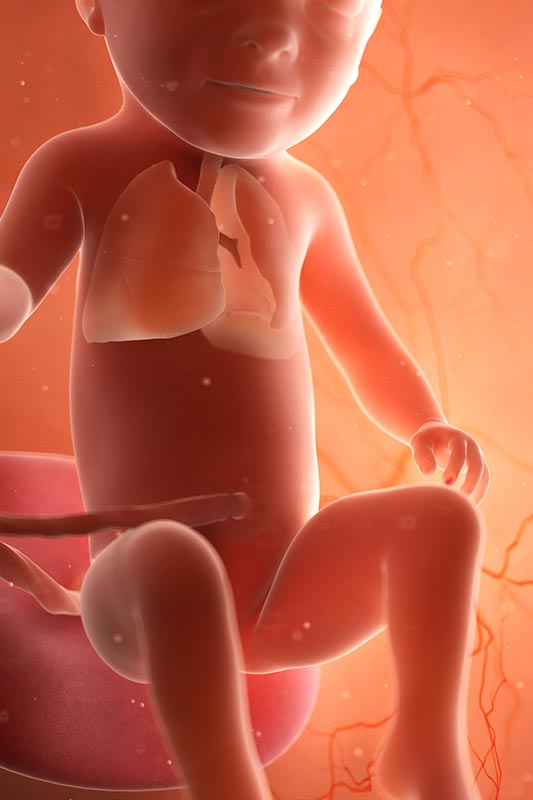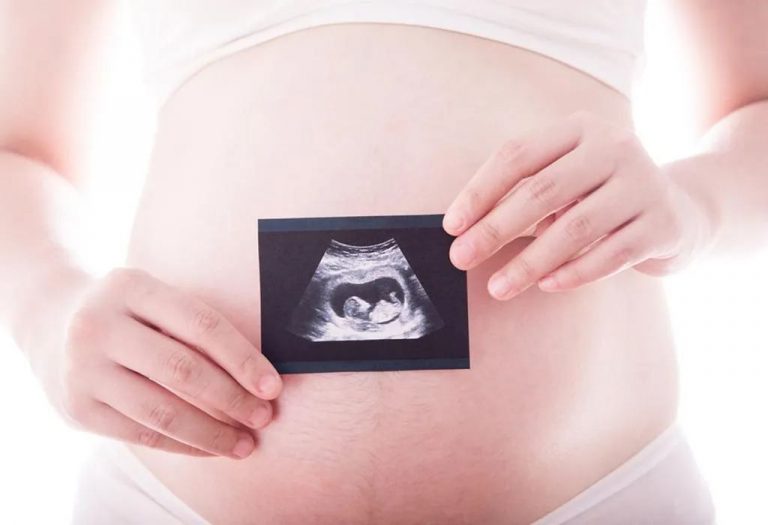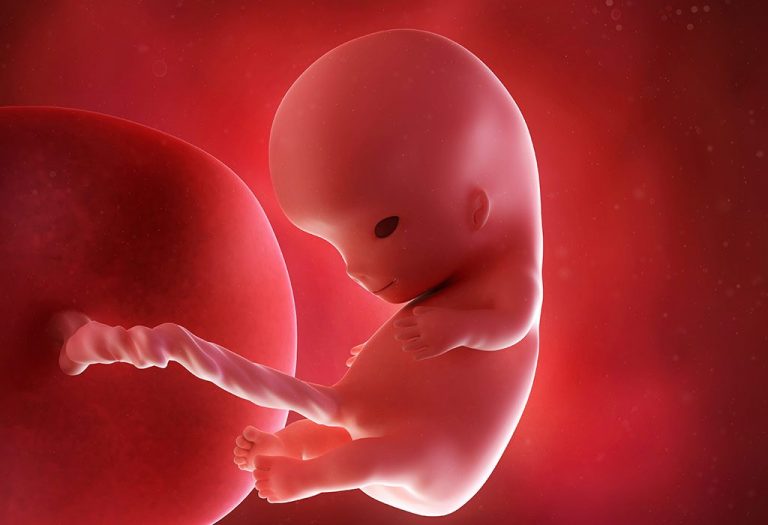29 Weeks Pregnant – Symptoms, Baby Size, Body Changes and Care

You have successfully stepped into the 29th week of your pregnancy. It’s the third trimester, and you must be anxious and equally excited as you are one step closer to the birth of your little bundle of joy. This would be a good time to think of your baby’s nursery, how you will decorate it, and what essentials you may need.
Don’t get overwhelmed by the advice that you get from almost everyone around you. Relax, take things one step at a time, and keep track of what’s in store during this exciting stage of your pregnancy.
Your Baby’s Growth During Pregnancy – Week 29
Your baby is growing and those tiny kicks and nudges you have been longing for are finally here. Your baby weighs more now, as the size of the head grows steadily with the development of her brain. The baby’s lungs and muscles start to mature and the development of the skeleton begins. The bones become harder and stronger and the baby requires more calcium.
What Is the Baby’s Size?
When you are 29 weeks pregnant the baby’s size is usually 15.2 inches long, and she weighs around 2.5 pounds (1.1Kg), that’s roughly the size of an acorn squash. The baby’s length might increase a little during the next 11 weeks, but the weight might double or triple during this period.
Common Bodily Changes
At 29 weeks, your belly is considerably noticeable, and you might be unable to bend over completely. One of the significant bodily changes during pregnancy is weight gain. You should have ideally gained around 8 Kg to 11 Kg, but the figure varies from person to person. You might want to consider the following:
- Your breasts get bigger and heavier, so it is advisable to wear a supportive bra (a sports bra or a nursing bra should do fine).
- There are many options for maternity underwear, ensure you choose the one that makes you feel the most comfortable.
Symptoms of Pregnancy at Week 29
These are the few symptoms that you will experience at 29 weeks:
- Heartburn is a 29 week pregnancy symptom that you will continue to experience.
- You may have difficulty breathing as the growing baby exerts pressure on your lungs.
- Constipation and haemorrhoids (swelling in the rectal area) may be caused by the increased baby weight.
- Lightheadedness or memory lapses and concentration problems may be experienced due to the increase in the production of hormones.
- You also might experience back and leg pain.
- Itching in the belly area due to the stretched skin.
- Discomfort while sleeping due to the large baby bump.
- Frequent urination.
Your Belly at 29 Weeks of Pregnancy
At this stage, your belly is considerably big and still growing. The baby now makes discernible movements, and you can place your hand on your stomach and feel your little one move.
Ideally, the baby is pretty active at this stage and feels cramped inside the uterus. Keeping a count of kicks is essential. The baby should kick about ten times in 2 hours. If you notice reduced foetal activity, do not panic. Give a gentle massage on the belly or drink some ice water and lie down on your side. If you feel no activity, call your doctor or visit the hospital emergency room.
The Ultrasound at 29 Weeks
The 29 weeks scan will show you how quickly your baby is growing. Those kicks and jabs are getting more frequent and stronger as the baby has little space to move inside. Occasionally, you might feel sporadic twitch-like movements inside you. This is your baby having hiccups.
Your baby might look a little chubby on the ultrasound this time, now that she is getting some white fat under the skin which is different from the brown fat she already had, and her wrinkled skin is smoothening out. Fat is essential for regulating the baby’s body temperature (brown fat) and is also a source of energy for their activities (white fat).
The baby is in her developmental stage now, and significant changes in the baby’s overall growth take place. Her brain, vital organs and teeth start developing. It is essential to eat healthy food and follow a nutritious diet. Your baby’s genitals start evolving and could be more prominent on an ultrasound now.
Kick count is an important activity now. You need to keep a track of the kicks or even movements of the baby every day. Since the foetal kicks are stronger, both you and your partner can experience these little movements and bond with your baby.
What to Expect at 29 Weeks Pregnant With Twins
At 29 weeks pregnant with twins, your body is working hard to accommodate the rapid growth of your babies. You may notice increased discomfort due to the added weight, along with more frequent Braxton Hicks contractions. It’s common to feel more tired and short of breath as your babies press against your diaphragm. At this stage, your 29 week twins are about the size of butternut squashes, and they are continuing to develop their lungs and gain fat.
Make sure to keep up with regular prenatal appointments to monitor both your health and the health of your babies.
What to Eat
Eating right is the secret to a healthy pregnancy. It is imperative to know what you can and what you cannot eat. Your baby is growing at a rapid pace, and so you should also cater to her growth requirements. The food in the 29th week of pregnancy should include iron, calcium, and vitamin C.
As your baby’s bones continue to harden, your calcium intake should be around 200 mg per day. Try to include lots of iron-rich food in your diet so your baby can take the required iron for making red blood cells. Green leafy vegetables, lean meat, and fortified cereal are good sources of iron.
You might have some cravings for sweets, cakes, chocolates and other fast foods but it is advised not to indulge in them on a regular basis, though occasional treats are allowed.
Food rich in vitamin C is also very good for the baby as it makes the connective tissue that is needed by the blood vessels. Grains, mangoes, sweet potatoes and carrots are some foods that are rich in vitamin C.
Eating a regular, balanced meal along with some mild physical activity is a good regime to follow during your pregnancy.
Tips & Care
Here are a few simple ways you can manage those pregnancy pains.
Dos
- Take plenty of rest when you can, and enjoy this magical period.
- Limit standing or sitting for a prolonged period of time as it reduces the blood flow through your body.
- Sleep on your left side as it helps in blood circulation.
- Use a good moisturiser for dry and itchy skin.
- Eat plenty of energy-rich healthy food.
- Drink lots of water and watch out for UTI (Urinary Tract Infections) symptoms.
- Prop up your legs when you can.
- Follow simple exercises.
Don’ts
- Do not suppress hunger, it is important to eat when you are hungry.
- Avoid crossing your legs as it might cut off blood circulation to your legs and cause swelling or varicose veins.
- Avoid lifting heavy objects or undertaking physical stress.
- Do not wear tight-fitting clothes to avoid discomfort.
- Avoid over-eating as it might cause excess weight gain.
- Do not sleep flat on your back as it may limit blood flow to the baby.
What You Need to Shop
What better than shopping to beat those pregnancy blues!
Here are some fun things you can shop for:
- Comfortable and pretty clothing, sleepwear as well as underwear
- Essential items for decorating the nursery (the baby’s room)
- Diaper, baby clothes, towels for your maternity bag
- Maternity clothing like maternity dresses which are super comfortable and flowy. This is especially needed to make way for the baby bump! You can also check out Bella Mama’s maternity sleepwear like nighties and pyjamas which offer nursing access below the panel. This comes in really handy after the baby is born.
Questions You Should Ask Your Doctor
As you progress through the 29 weeks trimester, it’s essential to stay informed about your health and your baby’s development. Regular checkups with your doctor provide the perfect opportunity to ask any questions you may have. Here are some important questions to consider:
- Is my weight gain on track for a healthy pregnancy?
- What can I do to relieve discomfort from back pain or swelling?
- Are there any specific foods or supplements I should focus on during this stage?
- How can I differentiate between normal Braxton Hicks contractions and real labor?
- What are the warning signs of preterm labor that I should look out for?
- How can I safely manage stress and anxiety during pregnancy?
- Is it safe to continue exercising, and are there any specific exercises I should avoid?
- What position is my baby currently in, and how might this affect delivery?
- What should I do if I notice a decrease in fetal movement?
- Are there any tests or screenings I should be aware of at this point in my pregnancy?
FAQs
1. Can I travel at 29 weeks of pregnancy?
It is generally safe to travel at 29 weeks, but it’s important to consult your doctor first. They may advise against long trips, especially if you are at risk for preterm labor. If you do travel, make sure to take breaks, stay hydrated, and move around to avoid swelling and blood clots.
2. Why am I experiencing more vivid dreams at 29 weeks?
Hormonal changes and disturbed sleep patterns during pregnancy often lead to vivid or strange dreams. As you approach your third trimester, physical discomfort, anxiety, and anticipation of the baby’s arrival may also contribute to more intense dreaming.
3. Is it normal to have vision changes at 29 weeks pregnant?
Yes, some women experience vision changes due to fluid retention or hormonal fluctuations, which can affect the shape of the eye or reduce tear production, leading to dry or blurry vision. It’s usually temporary, but if you notice sudden or severe vision problems, consult your doctor.
This was all about the twenty-ninth week of pregnancy. The baby will be due in a few short weeks now and, you can use this information to keep yourself healthy and prepare a comfortable abode for the baby, once born.
References/Resources:
1. Week 29; NHS; https://www.nhs.uk/start-for-life/pregnancy/week-by-week-guide-to-pregnancy/3rd-trimester/week-29/
2. Fetal development: The 2nd trimester; Mayo Clinic; https://www.mayoclinic.org/healthy-lifestyle/pregnancy-week-by-week/in-depth/fetal-development/art-20046151
3. How Your Fetus Grows During Pregnancy: FAQs; American College of Obstetricians and Gynecologists; https://www.acog.org/womens-health/faqs/how-your-fetus-grows-during-pregnancy
4. Fetal Development; Cleveland Clinic; https://my.clevelandclinic.org/health/articles/7247-fetal-development-stages-of-growth
5. Roman. A, Ramirez. A, Fox. N; Prevention of preterm birth in twin pregnancies (American Journal of Obstetrics & Gynecology MFM); Science Direct; https://www.sciencedirect.com/science/article/abs/pii/S2589933321002470; March 2022
6. Nutrition During Pregnancy: FAQs; American College of Obstetricians and Gynecologists; https://www.acog.org/womens-health/faqs/nutrition-during-pregnancy
7. Huecker. B, Jamil. R, Thistle. J; Fetal Movement; National Library of Medicine; https://www.ncbi.nlm.nih.gov/books/NBK470566/
Previous Week: 28 Weeks Pregnant
Next Week: 30 Weeks Pregnant
Was This Article Helpful?
Parenting is a huge responsibility, for you as a caregiver, but also for us as a parenting content platform. We understand that and take our responsibility of creating credible content seriously. FirstCry Parenting articles are written and published only after extensive research using factually sound references to deliver quality content that is accurate, validated by experts, and completely reliable. To understand how we go about creating content that is credible, read our editorial policy here.






